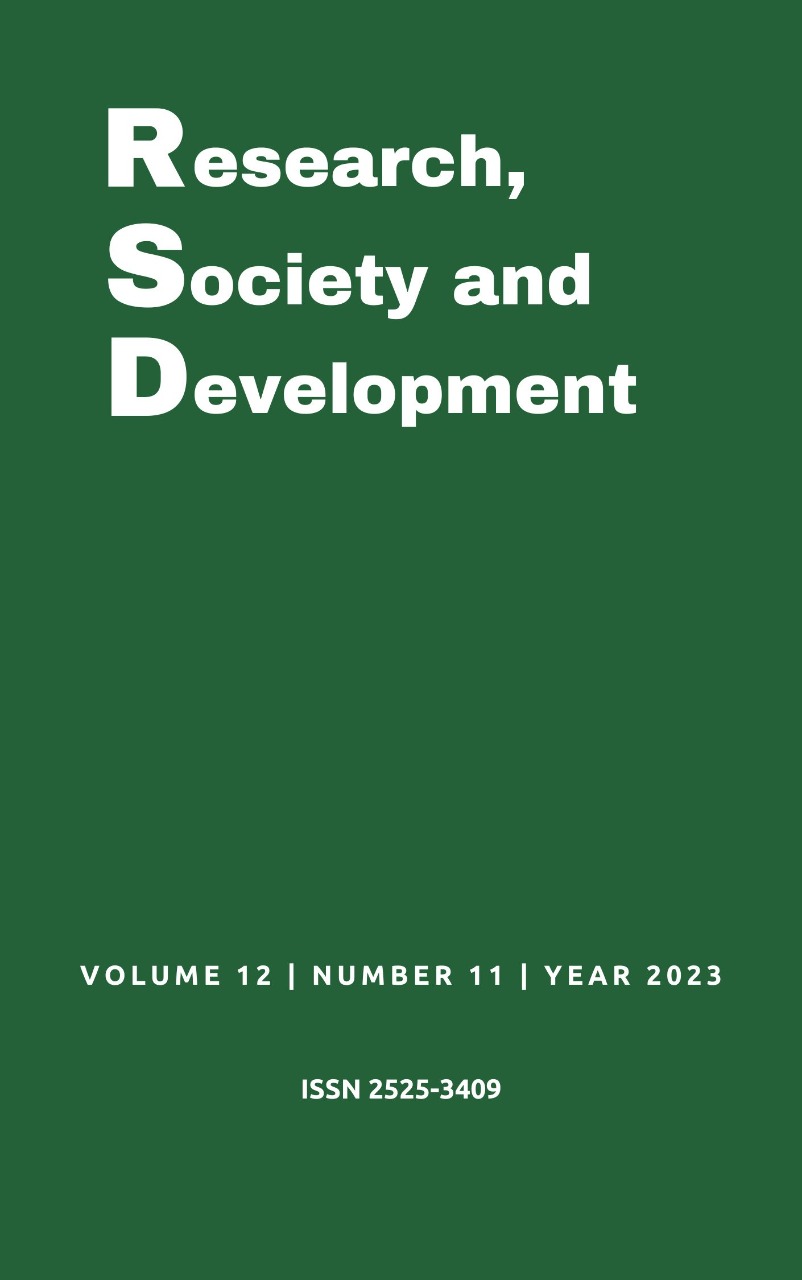The practice of psychology professionals in disaster and emergency situations
DOI:
https://doi.org/10.33448/rsd-v12i11.43743Keywords:
Practice psychological, Disaster, Emergencies.Abstract
This narrative bibliographical article invites academics and psychology professionals to reflect and contextualize their practice in a field of activity that grows according to human evolution and permeates it: disaster and emergency situations. In order to assign meaning to their practice based on who is affected by it, this article aims to reflect and identify possible conduct that professionals can adopt as part of their practice. Therefore, it is necessary to emphasize some guidelines that contribute to action in this field, being them the ethical conduct of the professional, the understanding of the dynamics of human suffering and psychological counseling, where such procedures are directly linked to the subject's core, which enables a greater support for the construction of the psychologist's practice in the face of disaster and emergency situations. Nevertheless, without the idealization of parameters that can support their practice, there is a lack of dialogue on the topic, which leads to a lack of interest among professionals in the field, precisely because they do not understand what structures their own practice. In this way, interventions need to be articulated with a focus on maintaining the life and health of suffering human beings, ensuring attention to their basic needs and possibilities for restructuring their lives.
References
Arantes, A. C. Q. (2021). Pra vida toda vale a pena viveaar. Sextante.
Barbosa, L. A. S., Damasceno, R. S., & Costa, M. S. A. (2023). Psicologia das emergências e desastres no Brasil: uma revisão de literatura. IMED.
Bruck, N. R. V. (2009) Psicologia das emergências. SENASP/MJ
Chaves, P. B., & Henriques, W. M. (2008). Plantão psicológico: de frente com o inesperado. Argum
Coêlho, A. E. L. (2010) A psicologia em situações de emergências e desastres. Jornal/CRP13.
Conselho Federal de Psicologia/CFP (2013) Atuação de psicólogos em situações de emergências e desastres, relacionados com a política nacional de defesa civil. Nota técnica de 08 de maio de 2013.
Conselho Federal de Psicologia/CFP (2021) Referências técnicas para atuação de psicólogas(os) na gestão integral de riscos, emergências e desastres. Referência técnica de 2021.
Conselho Regional de Psicologia/CRP-RS (2013) Entre linhas, enfrentamento de crises em situações de emergências e desastres. Caderno de orientações de 2013.
Conselho Regional de Psicologia do Paraná/CRP-PR (2019) Orientações breves sobre a atuação da(o) psicóloga(o) na gestão integral de riscos e de desastres. Caderno de orientações de 2019.
Daher, A. C. B., Ortolan, M. L. M., Sei, M. B., & Victrio, K. C. (2017). Plantão psicológico a partir de uma escuta psicanalítica. Semina.
Frainer, J. (2020). Metodologia científica. Uniasselvi.
Franco, M. H. P. (2021). A intervenção psicológica em emergências. Summus
Freud, S. (1915/2021). Epistemologia da pulsão: fantasia, ciência, mito. In: As pulsões e seus destinos. Autêntica.
Freud, S. (1930/2021). O mal-estar na cultura. In: O mal estar na cultura, sociedade, religião e outros escritos. Autêntica.
Freud, S. (1921/2021). Psicologia das massas e análise do eu. In: O mal estar na cultura, sociedade, religião e outros escritos. Autêntica.
Garcia, I. P, & Faria, H. M. C. (2020). A vivência do luto no contexto de desastres e emergências. UniAcademia.
Gonçalves, R. S. P. (2019). O trabalho do psicólogo em situações de emergências e desastres. IJUI/RS
Gomes, F. M. D. (2008). Plantão psicológico: novas possibilidades em saúde mental. SPAGESP.
Kock, J, Andrade, M., & Mendonça, P. (2023) Notas introdutórias sobre a atuação do psicólogo frente às emergências e desastres coletivos. Revista da graduação em psicologia PUC Minas.
Mattedi, M. A. (2008). A abordagem psicológica da problemática dos desastres: um desafio cognitivo e profissional para a psicologia. Psicologia. Ciência. Profissão.
Meller, V. (2015). Primeiros auxílios psicológicos para indivíduos envolvidos em situações emergenciais e desastres. Diaphora.
Oliveira, S. R, Conceição, P. W. R, Araújo, F. G. A, Sousa, C.P, Magalhães, G.S, Araújo, M. M. P, Pacheco, F. W. F. V, Coelho, D. E. M, Vieira, R. B. F., & Soares, M. L. (2022). Psicologia nas emergências e desastres: principais técnicas a serem utilizadas em situações de crise. Research, Society and Development.
Organização Mundial da Saúde/OMS (2015) Primeiros cuidados Psicológicos. OMS/Genebra 2015.
Rosa, A. C. S., Sousa, B. A., & Silva, G. A. G. (2022). A atuação de profissionais da psicologia na gestão de riscos e desastres. UMA
.
Rother, E. T. (2007). Revisão sistemática e revisão narrativa. Acta.
Silva, J. C. B, & Menezes, J. A. (2021). Discursos sobre o risco no contexto da gestão de emergências e desastres. Psicologia em revista.
Souza, M. T, Silva, M. D., & Carvalho, R. (2009). Revisão integrativa: o que é e como fazer. Revisão.
Shoygu, J. S. (2014) Psychological aid in crisis and emergency situations: psychological follow-up by emergency-related professionals. Russian Psychological Society.
Trindade, M. C, & Serpa, M. G. (2013) O papel dos psicólogos em situações de emergências e desastres. Estudos. Pesquisas. Psicologia.
Weintraub, A. C. A. M, Noal, D. S, Vicente, L. N., & Knobloch, F. (2015). Atuação do psicólogo em situações de desastre: reflexões a partir da práxis. Interface.
Downloads
Published
Issue
Section
License
Copyright (c) 2023 Aaron Novais Seixas; Ellen Caroline Chrun Vianna

This work is licensed under a Creative Commons Attribution 4.0 International License.
Authors who publish with this journal agree to the following terms:
1) Authors retain copyright and grant the journal right of first publication with the work simultaneously licensed under a Creative Commons Attribution License that allows others to share the work with an acknowledgement of the work's authorship and initial publication in this journal.
2) Authors are able to enter into separate, additional contractual arrangements for the non-exclusive distribution of the journal's published version of the work (e.g., post it to an institutional repository or publish it in a book), with an acknowledgement of its initial publication in this journal.
3) Authors are permitted and encouraged to post their work online (e.g., in institutional repositories or on their website) prior to and during the submission process, as it can lead to productive exchanges, as well as earlier and greater citation of published work.


